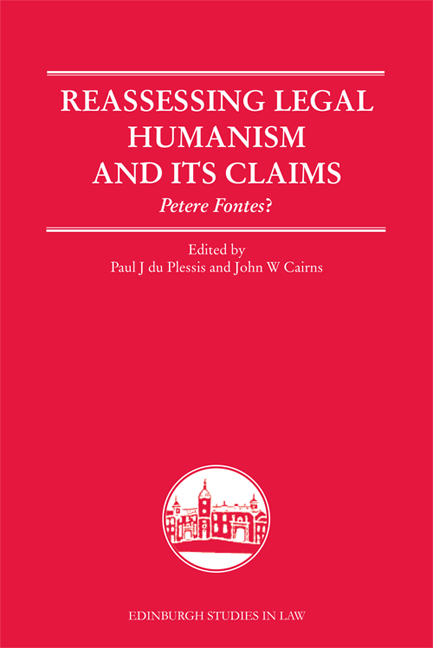Book contents
- Frontmatter
- Contents
- Preface
- A Note on Names and Book Titles
- List of Contributors
- List of Abbreviations
- Introduction
- Part I DEFINING LEGAL HUMANISM
- Part II A BREAK WITH THE PAST/CONTEMPORARY CRITIQUES
- Part III LEGAL HUMANISM: A PAN-EUROPEAN METHODOLOGY?
- Part IV LEGAL HUMANISM AND THE BOOK TRADE
- Postscript
- Index
Introduction
Published online by Cambridge University Press: 05 September 2016
- Frontmatter
- Contents
- Preface
- A Note on Names and Book Titles
- List of Contributors
- List of Abbreviations
- Introduction
- Part I DEFINING LEGAL HUMANISM
- Part II A BREAK WITH THE PAST/CONTEMPORARY CRITIQUES
- Part III LEGAL HUMANISM: A PAN-EUROPEAN METHODOLOGY?
- Part IV LEGAL HUMANISM AND THE BOOK TRADE
- Postscript
- Index
Summary
William Forbes (1668/1671–1745) neatly expressed a view of what we now know as legal humanism in his “Great Body of the Law of Scotland” when he wrote:
Andreas Alciat a Milaneze was the first who united the study of the law with polite learning and the knowledge of antiquities. Many learned men who by their elaborate writings afford much light to the Roman law, have copied after him. But James Cujace, born at Tholause, acquired and discovered so complete a knowledge of it that he has surpassed all that went before him and is a true guide to those that came after him.
Forbes was educated in arts, probably at the University of St Andrews, and probably also in law, in the latter possibly at the University of Leiden in the Low Countries. In 1696, he was admitted as an advocate of the Scots bar. Between 1703 and 1714, he published a number of works on Scots law. He enjoyed the patronage of the powerful family of Dalrymple of Stair, and in 1713 he was appointed as the first Professor of Civil Law in the University of Glasgow. The issue of legal humanism and its values was important for Forbes, since he thought that Roman law was authoritative in Scotland. If he had in fact been educated in law at the University of Leiden or indeed any other university in the Netherlands (as seems likely), he would have been quite extensively exposed to Dutch legal humanism or elegant jurisprudence, whether or not he had studied with a luminary such as Gerard Noodt (1647–1725). But no matter, Forbes was repeating a commonplace of his age: polite or elegant learning in Roman law began with Andrea Alciato (1492–1550), who was the first to link the study of Roman law with that of letters and, in particular, with the study of history; Jacques Cujas (1522–1590) from Toulouse was the supreme scholar of the movement. Indeed, in the lemmatic commentary Forbes composed on Justinian's Institutes, he described Cujas as “incomparabilis”. It is worth noting that those now known as legal humanists were in the past seen to constitute the schola Cuiaciana; it is also telling that two great Dutch elegant scholars, Noodt and Anton Schulting, could each be described as the “Dutch Cujas”.
- Type
- Chapter
- Information
- Reassessing Legal Humanism and its ClaimsPetere Fontes?, pp. 1 - 8Publisher: Edinburgh University PressPrint publication year: 2015



